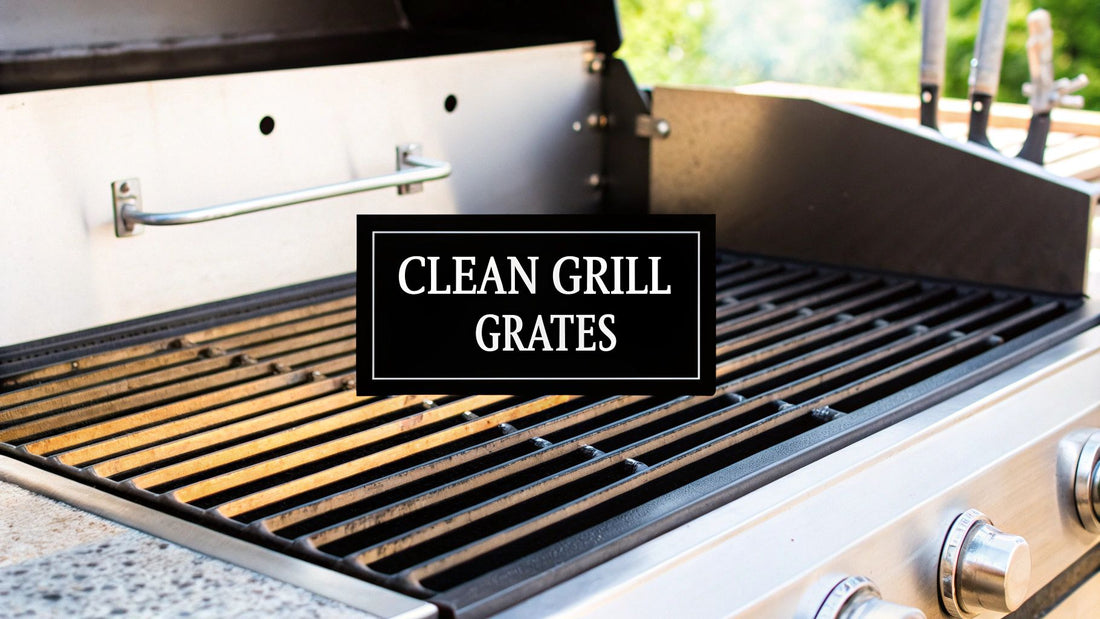
How to Properly Clean Gas Grill Grates for Perfect Results
Share
To keep your gas grill grates in top shape, think of upkeep as part of your daily rhythm rather than a once-in-a-blue-moon chore. A quick, 15-minute high-heat burn-off after service loosens most of the debris. Follow that with a brisk pass of a sturdy wire brush and you’ll find yourself staring at near–fresh-from-the-factory bars every single day.
Every couple of weeks, set aside a little extra time for a deeper scrub. Remove the grates, soak them in a degreaser solution, and give stubborn spots a second round with a nylon pad. It’s amazing how a consistent schedule cuts down on elbow grease and prevents carbon from turning into culinary kryptonite.
Why A Clean Grill Is Your Restaurant’s Secret Weapon
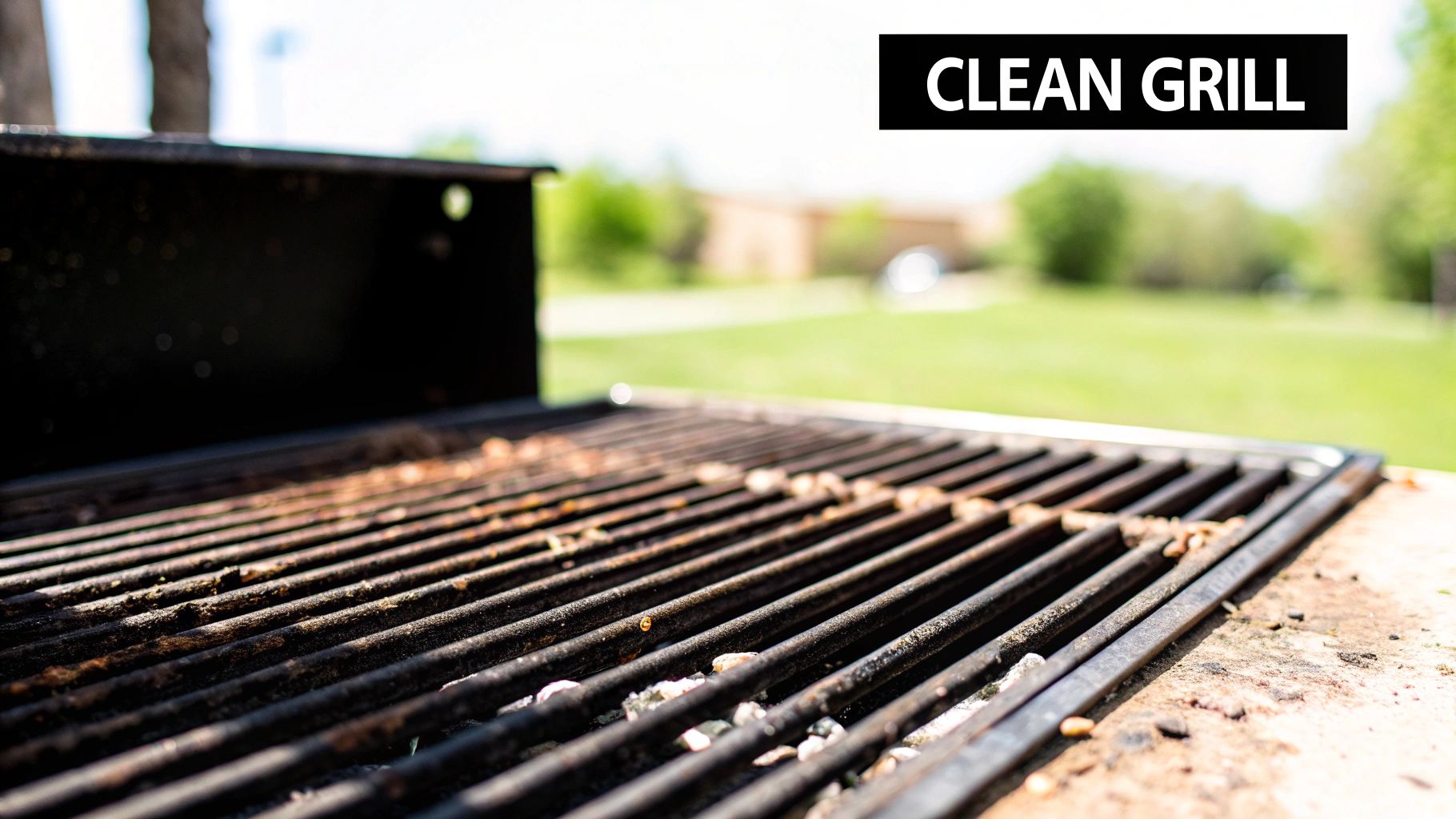
Walk into any professional kitchen at dinner rush and you’ll see why spotless grates matter. When charred residue builds up, two things happen:
– Your signature flavors get hijacked by bitter, burnt notes
– Hotspots and cool zones form, turning a simple cook into a guessing game
If that’s not enough, clogged grates are a flash fire waiting to happen. Grease drips into burners, flare-ups spark up, and safety becomes an afterthought. In short, neglecting grill maintenance is a recipe for wasted ingredients, uneven plates, and worried staff.
The Foundation Of Quality Grilling
A restaurant that prides itself on consistency can’t afford uneven sears or mystery flavors. Clean grates deliver:
- Even Heat Distribution: No more overcooked edges or raw middles
- Pure Taste Profiles: Let your marinades and rubs shine
- Enhanced Safety: Reduced flare-ups means calmer hands at the helm
The global market for gas grills is projected to grow from around $5 billion to nearly $8 billion by 2033, highlighting the importance of efficient and easy-to-maintain grilling solutions. Learn more about the gas grill market trends on datainsightsmarket.com.
None of this happens by accident. You need the right charbroiler under the hood to make routine cleaning as painless as possible. For your restaurant, we offer a wide selection of commercial charbroilers designed for performance and easy maintenance, including:
- Infrared Charbroilers for intense, even heat that sears perfectly
- Gas Charbroilers offering classic performance and precise temperature control
- Electric Charbroilers that provide consistent results and simple operation
Choosing the right charbroiler from the start simplifies your cleaning process and sets the stage for culinary success.
Equipping Your Kitchen for Flawless Grill Cleaning
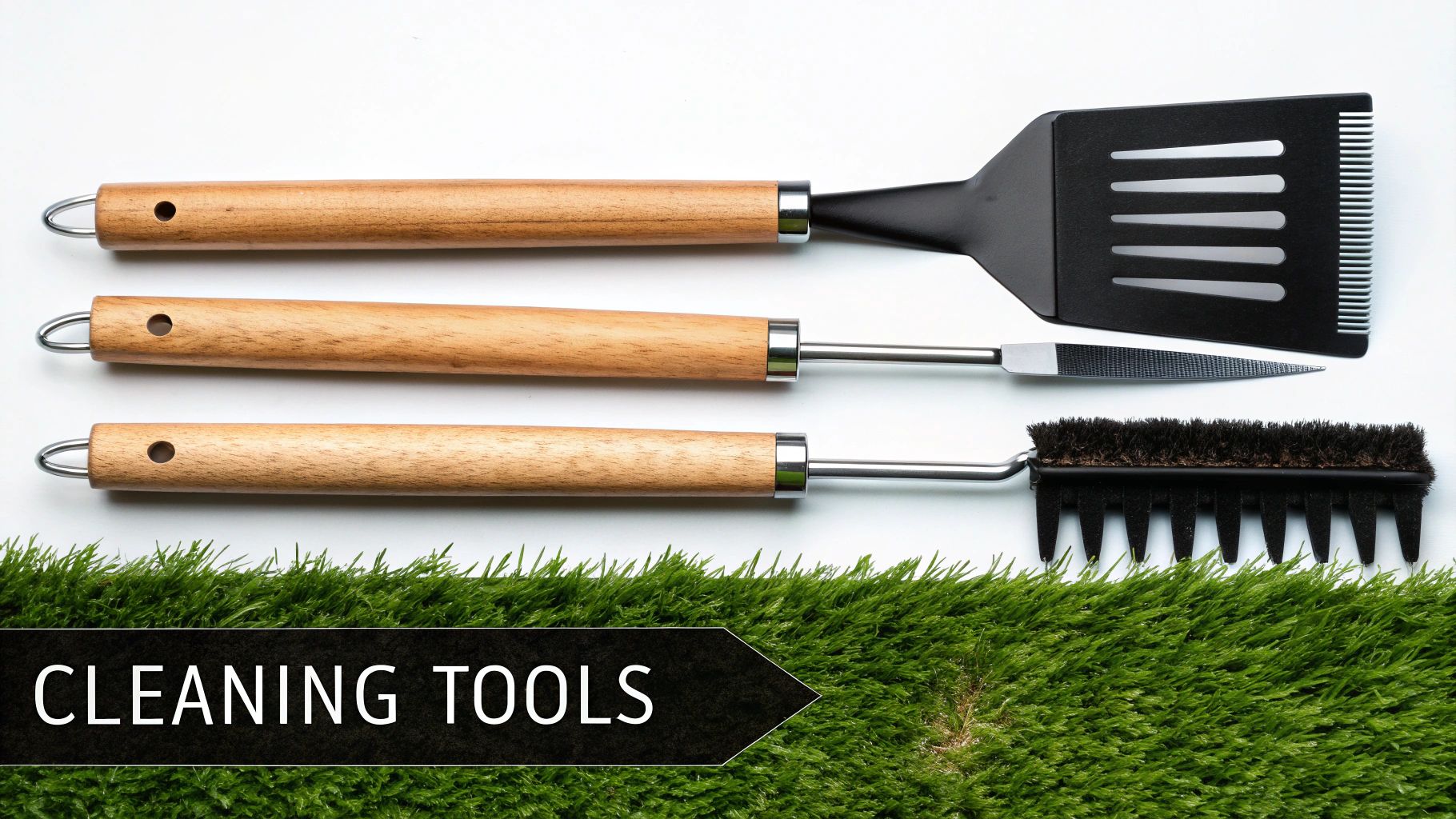
Let's be honest, cleaning grill grates can be a real beast of a job. But having the right gear on hand turns it from a dreaded end-of-night chore into a fast, effective part of your closing routine. Think of it like a specialized toolkit. Without it, your crew is just wasting elbow grease and time for subpar results.
The cornerstone of any good grill cleaning kit is a heavy-duty brush. The bristle material you choose is absolutely critical, and it all comes down to what your grates are made of. For those common porcelain-coated grates, brass bristles are your best friend. They're tough enough to bust through grime but soft enough to avoid scratching that delicate finish.
Choosing the Right Tools for the Job
Got tougher grates like cast iron or solid stainless steel? That’s where a stainless steel bristle brush comes in. It has the aggressive bite needed to power through that stubborn, baked-on carbon. A flat-edged metal scraper is another non-negotiable tool for demolishing those thick, black layers that build up over weeks of service.
Of course, your toolkit isn’t complete without the right safety gear and cleaning agents.
- Heat-Resistant Gloves: These are a must-have, period. They let your staff handle still-warm grates and work safely near the grill, preventing nasty burns.
- Commercial Degreaser: A professional-grade, food-safe degreaser is formulated to melt away that sticky, polymerized grease in a fraction of the time, saving you a ton of labor on deep cleans.
- Natural Alternatives: For lighter daily wipe-downs or kitchens that prefer eco-friendly options, a simple paste of baking soda and water or a spray bottle of vinegar can work wonders.
A quick but crucial word of caution: Always use a degreaser that is rated as food-safe and made for cooking equipment. Never grab a can of oven cleaner. Those harsh chemicals can strip the seasoning right off your cast iron and leave behind nasty residues you don't want anywhere near your customers' food.
Picking the right tool for each task is half the battle. To make it easier, I've put together a quick comparison of the essentials.
Essential Grill Cleaning Tool Comparison
| Tool Type | Material | Best For | Pro Tip |
|---|---|---|---|
| Grill Brush | Stainless Steel | Cast iron and stainless steel grates | Use long, firm strokes while the grate is still warm for maximum effect. |
| Grill Brush | Brass | Porcelain-coated or ceramic grates | Check bristles regularly for wear; loose wires are a safety hazard. |
| Grill Scraper | Metal | Removing thick, caked-on carbon buildup | Hold the scraper at a low angle to get under the carbon without gouging the metal. |
| Grill Brick | Pumice Stone | Flat top griddles and heavy-duty grates | Use with a bit of oil on a warm surface to create a non-stick, clean finish. |
Having this arsenal ready means the job gets done right every time, no excuses.
For a more comprehensive look at what your cleaning closet should contain, take a look at our guide on the best cleaning supplies for restaurants. The end goal is simple: give your team the tools to clean gas grill grates safely and efficiently. That's how you guarantee consistency and quality in every single dish you serve.
The Daily Burn-Off and Scrape Method
Think of this as the essential end-of-day ritual for your grill. It's the first line of defense against stubborn, caked-on gunk, and honestly, it’s a non-negotiable step in any high-volume kitchen. The daily burn-off and scrape is a simple routine, but it's what separates a well-maintained grill from a grimy mess.
The logic is pretty simple. After the last ticket, you crank the grill up to its highest setting for a good 15-20 minutes. This intense heat basically incinerates any leftover food, grease, and marinade clinging to the grates. This process, called pyrolysis, turns all that sticky residue into a dry, brittle ash that's incredibly easy to just scrape away.
Mastering the Technique
Once that residue turns white and ashy, you're ready to go. Turn off the burners completely. While the grates are still screaming hot (but with the flames off!), grab your heavy-duty wire brush and get to work.
Here’s a pro tip I’ve learned over the years: always brush parallel with the grate bars, not across them. This lets the bristles get right down into the grooves, cleaning out way more debris than a simple back-and-forth scrub. You'll hear a rough, gritty scraping sound at first. Keep going until that sound changes to a smoother, cleaner scrape—that's how you know the job is done.
Safety always comes first in a busy kitchen. Make sure your team is wearing proper heat-resistant gloves during this process. A few extra seconds to put on gloves is always worth it when you're working with equipment this hot.
This simple workflow shows the core steps for keeping those grill grates in prime condition, from the first scrape to the final wipe-down.
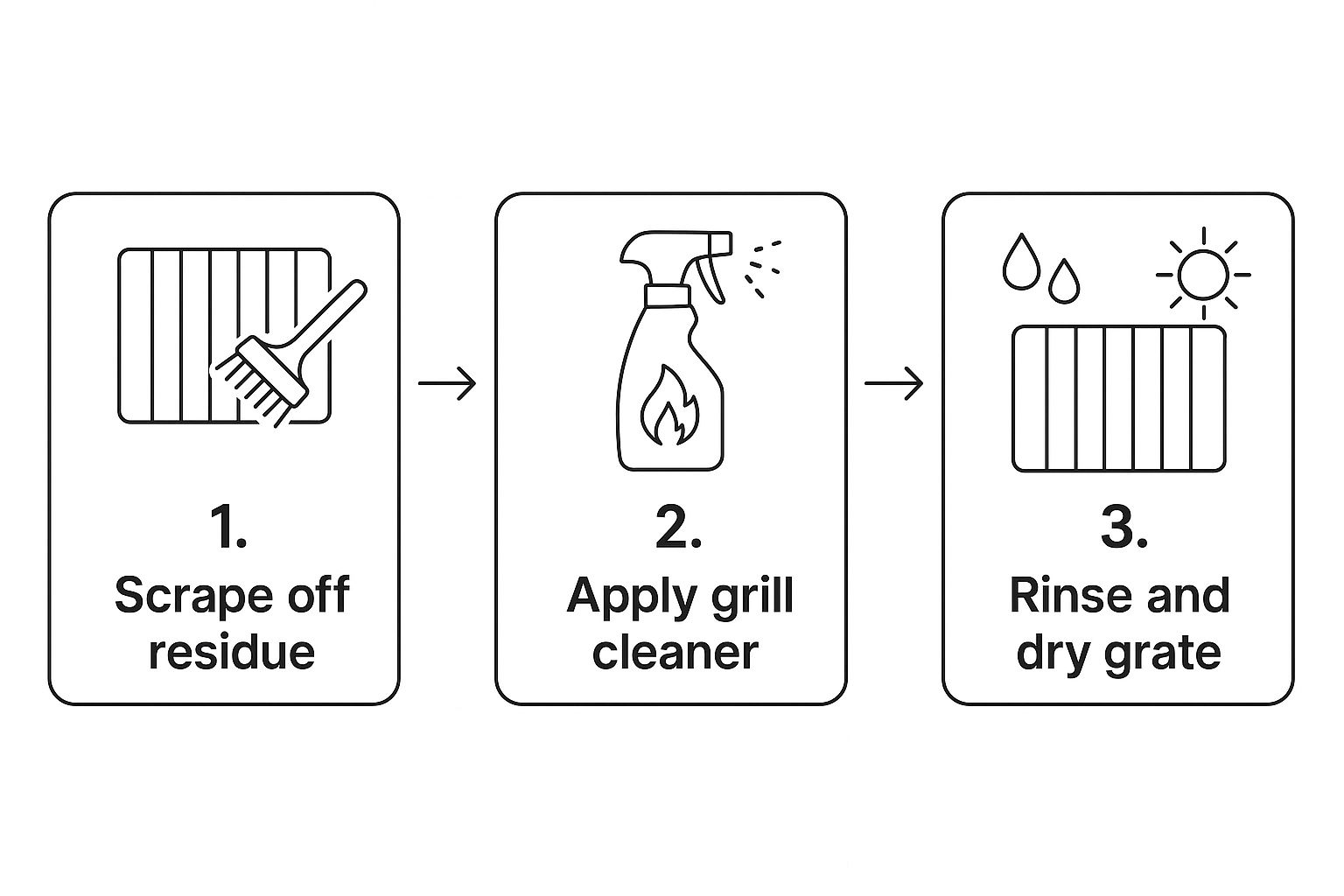
As you can see, a consistent, step-by-step approach is what ensures no residue gets left behind, which ultimately leads to a grill that performs better and lasts longer.
Making this burn-off and scrape a mandatory part of your closing duties means your commercial charbroiler starts fresh every single day. A clean start guarantees crisp, consistent sear marks, pure flavor, and a much safer cooking environment. It's a few minutes of work that pays off big time in both food quality and the lifespan of your equipment.
Give Your Grates a Deep Clean for a Fresh Start
While that daily burn-off is your first line of defense, some grease is just plain stubborn. Over time, it bakes on, polymerizes, and needs a more serious intervention. A periodic deep clean is how you hit the reset button on your grill grates, getting them back to peak performance and ensuring every dish has that pure, clean flavor your customers expect. This isn't just a quick scrape; it's a full-on restoration of your cooking surface.
First things first, let's talk safety. Always—and I mean always—make sure the grill is completely cool and the gas line is shut off before you start. No shortcuts here. Carefully lift the cold grates out of the unit and place them in a large utility sink or a heavy-duty plastic tub. You need something that can handle piping hot water and a strong degreaser without warping or cracking.
Soaking and Scrubbing: The Path to a Perfect Finish
Now for the part that does most of the heavy lifting for you: the soak. Fill your tub or sink with hot water and add a commercial-grade, food-safe degreaser. Submerge the grates completely and just let them be for at least 30-60 minutes. This is the critical step that softens and breaks down all that hardened gunk that a brush on its own couldn't dream of touching.
Once everything has had a good long soak, it’s time for a little elbow grease. Grab a stiff, non-abrasive scrub pad or a tough nylon brush and get to work on the loosened residue. If you're working with stainless steel, you can afford to be a bit more aggressive. For more specific advice on that, check out our detailed guide on how to clean stainless steel barbecue grates. After a thorough scrubbing, rinse the grates with clean, hot water to wash away every last trace of the degreaser.
The final two steps are arguably the most important for the life of your grates. You absolutely must dry them completely with a clean cloth to prevent any chance of rust, especially if you have cast iron. Once they are bone-dry, wipe on a very thin layer of high-smoke-point oil. This re-seasons the surface and restores that perfect non-stick barrier.
For kitchens that put their grills through exceptionally heavy use, bringing in professional deep cleaning services can be a smart move to ensure total sanitation and extend the life of your equipment.
Keeping your gear in top shape is just good business, especially as the demand for quality grilled food keeps climbing. In fact, the global gas grill market was valued at around USD 788.6 million in 2024 and is only expected to grow. It’s a clear sign that maintaining your equipment is more important than ever. You can dig into this trend by reading the full gas grill market report on reportsandinsights.com.
Keep It Clean: Proactive Maintenance and Smart Equipment Choices
The secret to dealing with stubborn grill grime? Don't let it build up in the first place. This isn't about scrubbing harder; it's about working smarter with preventative habits that make cleanup a breeze. The cornerstone of this entire strategy is properly seasoning your grates, especially if you're working with classic cast iron.
Seasoning is the simple process of baking a thin layer of oil onto the metal, creating a tough, non-stick barrier. This slick surface does more than just prevent food from sticking—it actively shields the grates from moisture and rust. To really get ahead of the cleaning game, you have to know how to season cast iron grates. Mastering this one technique will drastically cut down the effort it takes to clean gas grill grates later on.
Better Habits, Better Equipment
Even simple pre-cooking habits can make a huge difference. Just letting the grill preheat fully before service helps turn any leftover bits into carbon, making them ridiculously easy to brush off before that first ticket comes in. But these small steps are only half the battle. The quality of your equipment plays a massive role in how easy your daily maintenance will be.
The global barbeque grill market was valued at a staggering USD 5.28 billion in 2024, and gas grills own over 55% of that market. What's driving this? Innovations in grate materials, like coated stainless steel and advanced non-stick cast iron, are specifically designed to reduce food residue and make cleaning less of a chore.
This is exactly where investing in the right charbroiler pays for itself time and time again. Our entire selection of commercial charbroilers is engineered with maintenance in mind.
- Infrared Charbroilers: These units deliver intense, even heat that sears food fast, minimizing sticking and making the burn-off process incredibly simple.
- Gas Charbroilers: You get classic, reliable performance with heavy-duty grates designed from the ground up for easy scraping and daily use.
- Electric Charbroilers: They offer perfectly consistent results with components built for quick, hassle-free cleaning at the end of a long shift.
Every model we carry, from compact countertop units to heavy-duty floor models, is built with superior materials and smart designs that turn daily upkeep from a dreaded chore into a quick task.
For a complete walkthrough on creating that perfect, slick cooking surface, make sure you check out our in-depth guide on how to season cast iron grates for your restaurant.
Answering Your Top Grill Grate Cleaning Questions
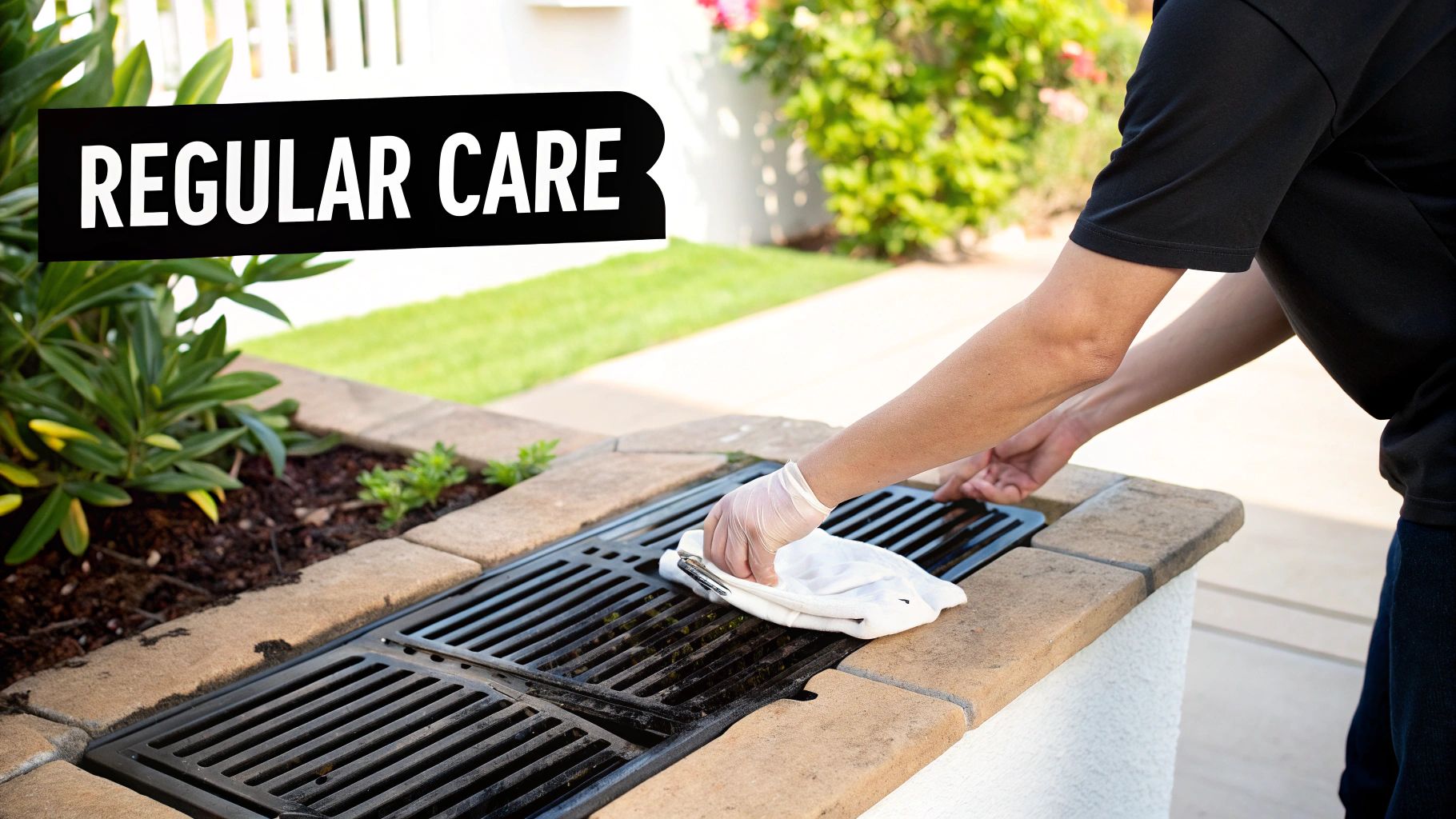
Even with a solid cleaning routine, questions always pop up in the heat of service. I get it. When you're in the trenches, you need fast, practical answers to keep your equipment running like a champ. Let's tackle some of the most common questions I hear about keeping gas grill grates in prime condition.
How Often Should I Really Deep Clean My Grates?
For most restaurants, a full-on deep clean once a week is the sweet spot. This is usually enough to stop any serious carbon buildup and keep those dreaded flare-ups under control.
Now, if your menu is heavy on fatty proteins like pork belly or you use a lot of sugary BBQ sauces and marinades, you’ll probably need to bump that up to twice a week. A good rule of thumb I tell my clients: if your daily burn-off and scrape-down isn't cutting it anymore, it’s time for a deep clean.
Can I Just Use Oven Cleaner on the Grates?
Please don't. I strongly advise against using a standard oven cleaner on your grill grates, especially if they're cast iron. That stuff is incredibly harsh and will strip away the seasoning you've worked so hard to build up. Worse, it can leave behind chemical residues that are definitely not food-safe.
Always stick with a degreaser specifically formulated for commercial kitchen equipment. The most important step? Make sure you rinse the grates thoroughly—and I mean thoroughly—after cleaning to wash away any and all chemical traces.
What's the Secret to Preventing Rust on Cast Iron Grates?
Moisture is the number one enemy of cast iron. It’s that simple. To keep rust from ever getting a foothold, you have to make sure your grates are bone dry before they go back on the grill after a deep clean.
Once they’re washed and completely dry, take a moment to apply a super-thin layer of a high-smoke-point oil. Think canola or grapeseed oil. Just wipe it over the entire surface with a cloth. This quick step re-seasons the grate and creates a protective barrier against humidity in the air.
Ready to elevate your restaurant's grilling game with equipment built for performance and painless maintenance? Check out our huge selection of commercial infrared, gas, and electric charbroilers at Charbroilers. Find the perfect charbroiler for your kitchen today!
